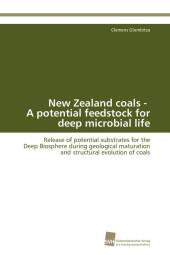 Neuerscheinungen 2011Stand: 2020-01-07 |
Schnellsuche
ISBN/Stichwort/Autor
|
Herderstraße 10
10625 Berlin
Tel.: 030 315 714 16
Fax 030 315 714 14
info@buchspektrum.de |

Clemens Glombitza
New Zealand coals - A potential feedstock for deep microbial life
Release of potential substrates for the Deep Biosphere during geological maturation and structural evolution of coals
Aufl. 2011. 340 S. 220 mm
Verlag/Jahr: SÜDWESTDEUTSCHER VERLAG FÜR HOCHSCHULSCHRIFTEN 2011
ISBN: 3-8381-2931-8 (3838129318)
Neue ISBN: 978-3-8381-2931-0 (9783838129310)
Preis und Lieferzeit: Bitte klicken
During the last decades of biogeochemical and microbiological research, the widespread occurrence of microorganisms was demonstrated in deep marine and terrestrial sediments. With this discovery inevitably, the question of potential carbon and energy sources for this deep subsurface microbial life arises. In sedimentary systems, such a source is provided by buried organic matter, deposited over geological times. During geochemical and geothermal maturation, this organic material undergoes biotic and abiotic alteration processes and is suggested, to release potential substrates into the surrounding. Previous studies showed, that especially oxygen containing compounds are lost from the macromolecular matrix during diagenesis and early catagenesis. Oxygen containing low molecular weight organic acids (LMWOAs) such as formate, acetate and oxalate represent important substrates for microbial metabolism. Thus, lithologies containing accumulated sedimentary organic matter (e.g. lignites and coals) may provide a large feedstock for deep microbial life releasing LMWOAs into the pore water during maturation.
Dr. Glombitza studied chemistry at the Humboldt University of Berlin and gained a diploma in organic chemistry in 2003. 2006 he joined the German Research Center for Geosciences (GFZ) in Potsdam and specialized in organic geochemistry and biogeochemistry. Since 2009 he works as a scientist at Potsdam University in the field of geomicrobiology.


